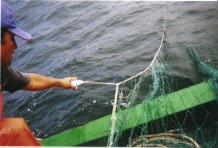articles

Pingers were tested on Peruvian fishing boats. Credit ProDelphinus
Peru "pinger" trial deters dolphins but not whales
A trial of underwater sound devices called pingers reduced the number of dolphins caught in fishing nets – but did not deter humpback whales.
Researchers from Peruvian marine conservation NGO ProDelphinus and the University of Exeter worked with small-scale fishers in Peru, where thousands of dolphins die due to bycatch (accidental catching) every year.
The study found that bycatch of small cetaceans (mostly dolphins) was 83% lower in nets with pingers, compared to those without.
However, 16 humpback whales were caught – eight in nets with pingers and eight in those without – so the researchers now plan to test lower-frequency pingers to deter whales.
"Small-scale net fisheries in Peru have some of the highest bycatch rates of dolphins and whales in the world," said Dr Jeffrey Mangel, of ProDelphinus and the University of Exeter.
"We urgently need solutions that allow animals to survive and fishers to fish safely and sustainably.
"In our study, we were pleased to see reduced bycatch of dolphins in nets fitted with pingers.
"Pingers are relatively expensive (about US$70) for fishers, but with support from NGOs and government, with fishers seeing less damage to their nets, and 'economies of scale', pingers could possibly gain wider adoption.
"This work is done in collaboration with fishers. We are working alongside them to find these win-win solutions that work for them, at a cost that works for them.
"We have an opportunity to try things in Peru that might be applicable to other places in the world."
Gillnets, one of the most common fishing methods worldwide, catch fish by entangling them. Many marine mammals, sea turtles and seabirds are also caught, and can drown before being cut free.
Commenting on the number of humpback whales caught by the fishing boats in the study, Dr Mangel said: "I was really surprised and concerned.
"We monitored 60 trips by three vessels – and there are thousands and thousands of fishing boats up and down this coast.
"While all 16 humpback whales were released alive, this usually involved cutting part of the net – and we know from previous research that whales that become stranded often do so because they're entangled in fishing nets.
"Catching whales is also dangerous for fishers. They are on small boats with the nets attached, so it can be very dangerous trying to cut a whale free.
"The damage or loss of nets is expensive. A lot of fishers stop fishing for up to six months during the whale season because there's too much risk of losing their nets."
Humpback whale populations in this region are recovering, so contact with whales is likely to become more common.
As the 10 kHz pingers in the study appeared not to deter whales, the researchers plan to test lower-frequency pingers in the future.
The boats in the study targeted fish including sharks, tuna and rays.
The research team were surprised to find a substantial (33%) decline in shark catch in nets fitted with pingers.
Previous studies have found no impact on sharks, and Dr Mangel said such a big decline in shark numbers could deter fishers from using them.
"We're not trying to negatively impact these people's livelihoods," he said.
"The goal is to work with them to make fishing as sustainable as possible."
Professor Brenda Godley, from the University of Exeter, said: "The long-term work undertaken by ProDelphinus is transforming marine conservation in the eastern Pacific, one of the most important areas for marine biodiversity in the world.
"It is a source of great pride that the University of Exeter is so closely involved with such leading-edge work that is shaping wildlife conservation and helping safeguard the long-term livelihoods of coastal people."
The study was funded by WWF Peru.
The paper, published in the journal Aquatic Mammals, is entitled: "Pingers reduce small cetacean bycatch in a Peruvian small-scale driftnet fishery, but humpback whale (Megaptera novaeangliae) interactions abound."
- Professor Callum Roberts, from the University of Exeter, will speak in New York on 23 May at an event called: "What will it take to protect the oceans?" For more information, visit https://www.exeter.ac.uk/news/events/details/index.php?event=12135
Date: 12 May 2022
